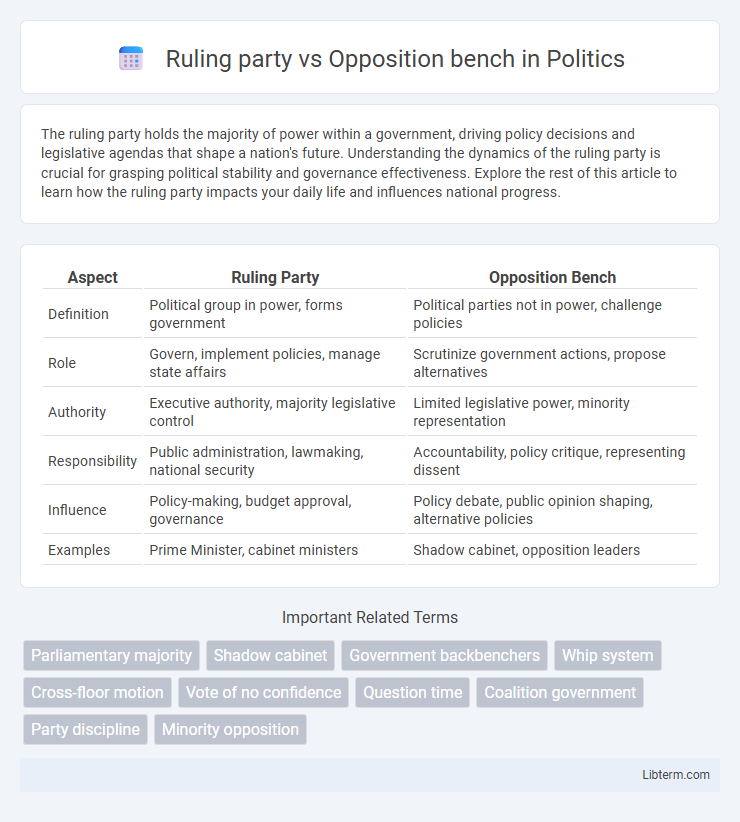The ruling party holds the majority of power within a government, driving policy decisions and legislative agendas that shape a nation's future. Understanding the dynamics of the ruling party is crucial for grasping political stability and governance effectiveness. Explore the rest of this article to learn how the ruling party impacts your daily life and influences national progress.
Table of Comparison
| Aspect | Ruling Party | Opposition Bench |
|---|---|---|
| Definition | Political group in power, forms government | Political parties not in power, challenge policies |
| Role | Govern, implement policies, manage state affairs | Scrutinize government actions, propose alternatives |
| Authority | Executive authority, majority legislative control | Limited legislative power, minority representation |
| Responsibility | Public administration, lawmaking, national security | Accountability, policy critique, representing dissent |
| Influence | Policy-making, budget approval, governance | Policy debate, public opinion shaping, alternative policies |
| Examples | Prime Minister, cabinet ministers | Shadow cabinet, opposition leaders |
Introduction to Ruling Party and Opposition Bench
The ruling party refers to the political party or coalition that holds the majority of seats in a legislative body and forms the government, responsible for policymaking and administration. The opposition bench consists of parties or members not in power, tasked with scrutinizing government actions, offering alternative policies, and representing dissenting voices. The dynamic between the ruling party and opposition bench is fundamental to democratic governance, ensuring accountability and balanced debate within the parliament.
Definition and Core Functions of the Ruling Party
The ruling party is the political organization that holds the majority of seats in the legislature and forms the government, responsible for implementing policies and enacting laws. It drives the legislative agenda, oversees the executive branch, and ensures governance aligns with its manifesto and public mandate. The opposition bench, comprising parties not in power, scrutinizes government actions and holds the ruling party accountable through debates and questions.
Role and Significance of the Opposition Bench
The Opposition bench plays a critical role in a parliamentary democracy by holding the ruling party accountable, scrutinizing government policies, and representing alternative viewpoints. It ensures transparency and encourages healthy debate, which strengthens democratic processes and policymaking. The presence of a robust Opposition bench is essential for preventing the concentration of power and safeguarding the interests of diverse segments of society.
Legislative Powers: Ruling Party vs Opposition
The ruling party wields significant legislative powers, controlling the agenda, drafting bills, and ensuring the passage of key legislation through majority votes. The opposition bench plays a critical role in scrutinizing, debating, and challenging proposed laws to ensure accountability and represent diverse viewpoints. Parliamentary committees often serve as platforms where both ruling and opposition members exercise influence over legislative details and policy outcomes.
Policy Formation and Implementation Differences
The ruling party drives policy formation by setting legislative agendas and allocating resources, enabling swift implementation through executive control and majority support in parliament. Opposition benches critique and challenge government proposals, often influencing policy by highlighting alternative approaches and mobilizing public opinion but lack direct control over implementation processes. These dynamics create a system of checks and balances, where ruling parties focus on execution efficiency while opposition prioritizes accountability and policy transparency.
Accountability and Checks on Government
The opposition bench plays a critical role in ensuring accountability by scrutinizing government policies and exposing inefficiencies or corruption within the ruling party. Mechanisms such as parliamentary questions, debates, and committee investigations enable systematic checks on government actions, preventing abuse of power. Effective interplay between the ruling party and opposition fosters transparency and strengthens democratic governance by holding the executive accountable to the legislature and the public.
Political Strategies and Party Dynamics
Ruling parties leverage legislative control and policy agendas to consolidate power and influence public opinion through strategic coalition-building and media engagement. Opposition benches focus on scrutinizing government actions, mobilizing public support, and forming alliances to challenge and negotiate policy decisions. Both utilize parliamentary procedures, party discipline, and grassroots campaigns to strengthen their political positioning and voter base.
Impact on Democratic Governance
The ruling party shapes legislative priorities and policy implementation, directly influencing the government's ability to deliver public services and maintain stability. The opposition bench ensures accountability by scrutinizing government actions, promoting transparency, and representing diverse viewpoints essential for inclusive decision-making. A balanced dynamic between the ruling party and opposition fosters robust democratic governance by preventing authoritarian tendencies and encouraging responsive, participatory administration.
Challenges Faced by Ruling and Opposition Parties
Ruling parties often face challenges such as managing diverse stakeholder interests, delivering on campaign promises, and ensuring effective governance while maintaining public support amid policy scrutiny. Opposition parties struggle with limited access to governmental resources, mobilizing public opinion against incumbents, and maintaining internal unity to present a credible alternative. Both face the constant pressure of sustaining political relevance and navigating parliamentary dynamics in highly competitive environments.
Conclusion: Balancing Power for Effective Governance
A healthy democracy relies on a balance between the ruling party and the opposition bench to ensure accountability and transparency in governance. Effective legislative processes emerge when diverse perspectives are represented, preventing the concentration of unchecked power. This equilibrium fosters policy-making that reflects the broader interests of society while maintaining stability and progress.
Ruling party Infographic

 libterm.com
libterm.com